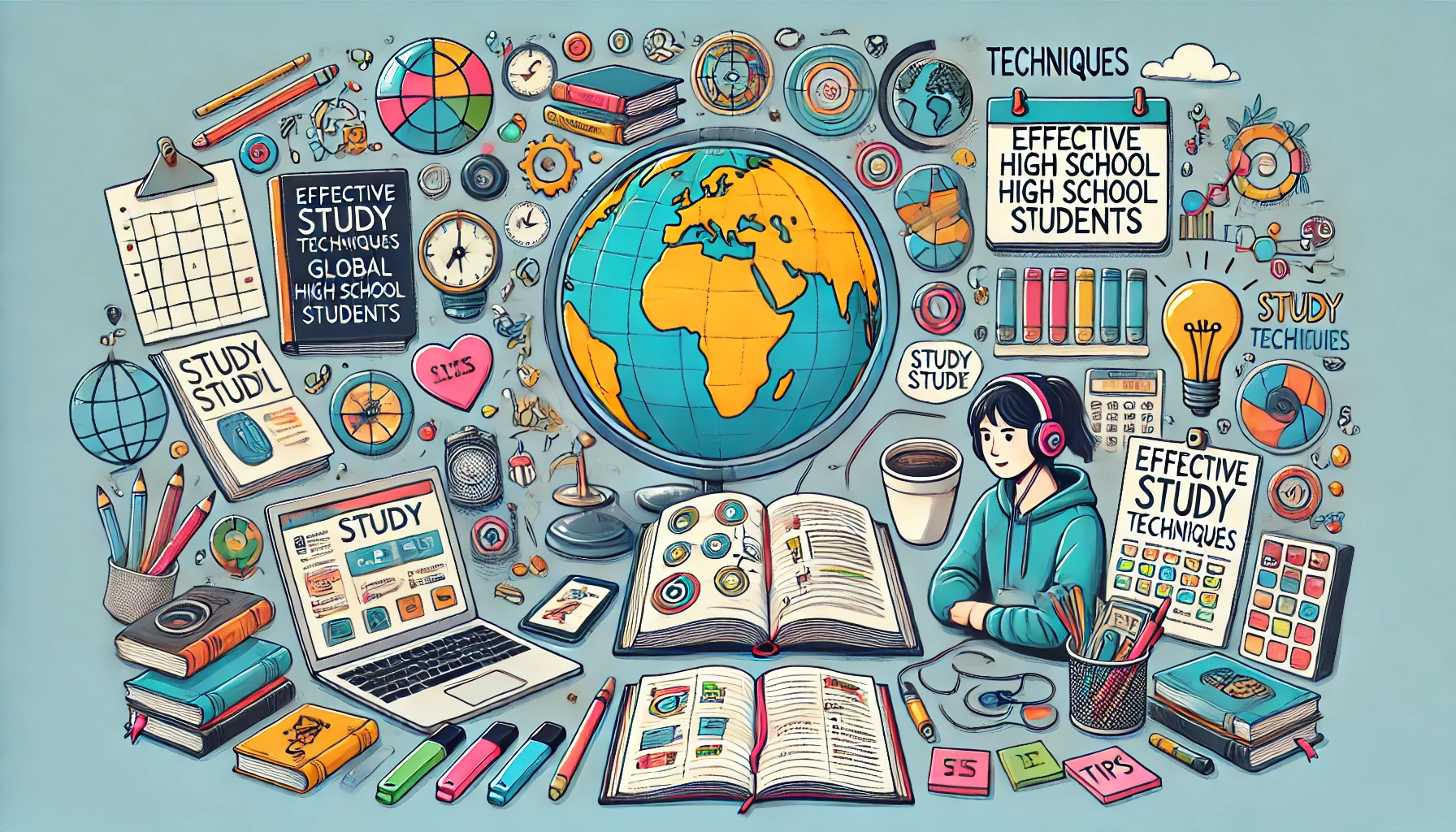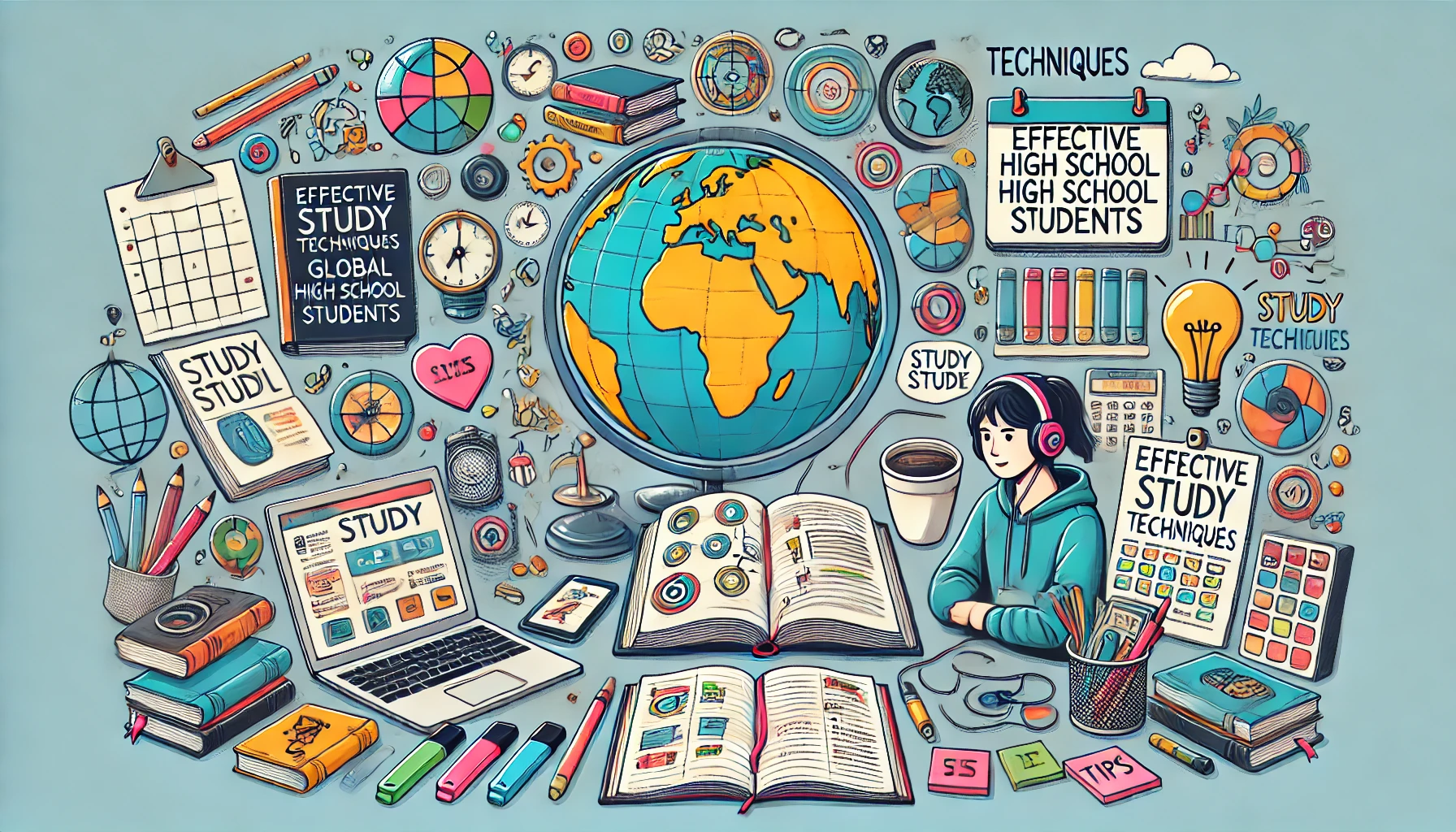

Succeeding in high school requires effective study techniques that support learning, retention, and academic achievement. For students pursuing rigorous programmes such as the International Baccalaureate (IB), understanding the significance of these techniques and how they contribute to academic success can make a substantial difference.
By exploring a range of study strategies, students can identify methods that best suit their individual learning styles and educational goals.
Understanding the Importance of Effective Study Techniques
Effective study techniques are vital to academic success, especially for IB students, who face demanding coursework, internal assessments, and exams. Structured study strategies help students absorb, retain, and recall information more effectively, fostering a robust knowledge base and enhancing critical thinking skills. By implementing proven study techniques, students can cultivate essential skills such as time management and self-regulation, which are key to thriving within the IB curriculum and beyond. The Approaches to Learning (ATL) Skills framework in the IB programme highlights the importance of these skills, encouraging self-directed learning and personal growth.
Active Reading for Engagement and Retention
One valuable study technique is active reading. Rather than merely skimming through materials, active reading involves engaging with the content by highlighting key points, taking detailed notes, and asking insightful questions. This approach encourages students to think critically, make connections to prior knowledge, and improve both comprehension and retention. For IB students, active reading is especially useful for subjects with extensive reading requirements, like History or Literature. The Theory of Knowledge (TOK) Guide also emphasises the importance of engaging deeply with texts and developing questioning skills, which are foundational to active reading.
💡This approach encourages students to think critically, make connections to prior knowledge, and improve both comprehension and retention.

Using Mnemonics to Aid Memory
Mnemonic devices are memory aids that help students remember information by linking it to familiar and easily recalled concepts. For instance, using the acronym “ROY G. BIV” to remember the colours of the rainbow is a well-known mnemonic. Mnemonics are beneficial for IB subjects that involve memorisation, such as Biology and Chemistry, helping students enhance memory recall in a creative, enjoyable way. Within the IB Language B Guide, strategies like mnemonics are recommended to aid in language retention, supporting the development of vocabulary and grammar skills in a structured yet engaging manner.
💡Mnemonics are beneficial for IB subjects that involve memorisation, such as Biology and Chemistry, helping students enhance memory recall in a creative, enjoyable way.
Choosing the Right Study Technique for IB Success
Choosing the right study technique is essential for students in demanding programmes like the IB, where balancing multiple subjects and assessments requires a strategic approach. The IB curriculum emphasises critical thinking, research skills, and self-management, making it particularly important to select study techniques that align with both individual learning styles and course demands.
Assessing Your Learning Style
Each student has a distinctive learning style—whether auditory, visual, or kinaesthetic—that influences how they absorb and retain information. Understanding these preferences helps students choose techniques aligned with their strengths. Auditory learners, for example, may benefit from recording lectures or explaining concepts aloud, while visual learners might find techniques like flashcards and mind maps useful.
Kinaesthetic learners, who learn best through hands-on activities, can benefit from practical experiments or simulations, especially in subjects like IB Chemistry or Physics. Incorporating movement—like pacing while reviewing notes or using interactive materials—can further enhance their learning experience.

Balancing Study Techniques with Course Requirements
In addition to learning styles, IB students must consider the unique demands of each course when selecting study techniques. For content-heavy courses like History and Biology, techniques like SQ3R can help students review extensive material efficiently. Subjects that focus on problem-solving, like Mathematics and Economics, may benefit from methods like the Feynman Technique, which clarifies complex concepts. Time management is critical within the IB, and combining techniques like the Pomodoro method with structured reading strategies can help prevent burnout and maintain focus. The Approaches to Learning (ATL)skills further underscores the importance of adapting techniques to subject requirements, particularly with time management and self-regulation.
Adapting Techniques for Different Subjects
Not all study techniques work equally well across subjects. Sciences often require hands-on experimentation and data analysis, while Literature and Language subjects demand close reading and textual analysis. Tailoring study techniques to the subject matter allows students to optimise their learning experience.
For scientific subjects, students can deepen their understanding through experiments, direct observation, and data interpretation. Creating concept maps or diagrams also helps visualise complex scientific ideas and their interconnections, making it easier to understand IB core requirements like the Internal Assessment (IA).
Conversely, Literature study requires a different approach. Close reading techniques—such as annotating, identifying literary devices, and analysing themes—are essential for understanding texts. Group discussions and book clubs also offer valuable perspectives on literary works, enriching students’ understanding and appreciation, especially for IB Theory of Knowledge (TOK) and Language A courses.

Implementing Study Techniques Effectively for Optimal Learning
Knowing a variety of study techniques is valuable, but effectively implementing them is key to achieving maximum results. Here are strategies to help IB students make the most of their study techniques:
Creating a Consistent Study Schedule
Consistency is crucial for effective studying. Establishing a regular study schedule creates a routine and ensures balanced time allocation for each subject. By managing time proactively and adhering to a schedule, students can minimise procrastination and boost overall productivity.
Combining Techniques for Maximum Efficiency
Rather than relying on a single technique, combining multiple strategies can amplify learning and retention. For instance, students might pair the Pomodoro Technique with the Feynman Technique to maximise focus and understanding or use mind maps alongside the SQ3R method to enhance comprehension and recall. Experimenting with various combinations enables students to refine their study habits and develop a personalised, effective approach.
Evaluating and Adjusting Study Techniques
Regularly evaluating the effectiveness of chosen study techniques and making necessary adjustments is essential. Reflecting on which techniques are most successful and identifying areas for improvement allows students to continually adapt and grow in their approach. Being open to trying new methods and adjusting to changing needs fosters continuous development and adaptability.

Concluding Thoughts on Effective Study Techniques
In conclusion, the importance of study techniques for high school students pursuing rigorous academic programmes, such as the IB, is paramount. Effective study techniques help IB students manage intensive coursework, internal assessments, and extended essays with greater ease. By understanding the role of these techniques, exploring various strategies, selecting those that fit their unique learning style, and implementing them effectively, students can significantly enhance their academic journey.
The IB curriculum places high value on self-directed learning and critical thinking, skills that are strengthened by techniques like the SQ3R method for content-heavy subjects or the Pomodoro Technique for sustained focus. Recognising individual learning styles, adapting techniques to different subject requirements, and consistently refining study habits all contribute to success within the IB programme. By prioritising effective study strategies, IB students not only excel academically but also develop lifelong skills that support their future aspirations and readiness for higher education.





